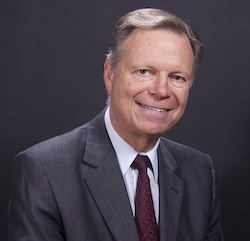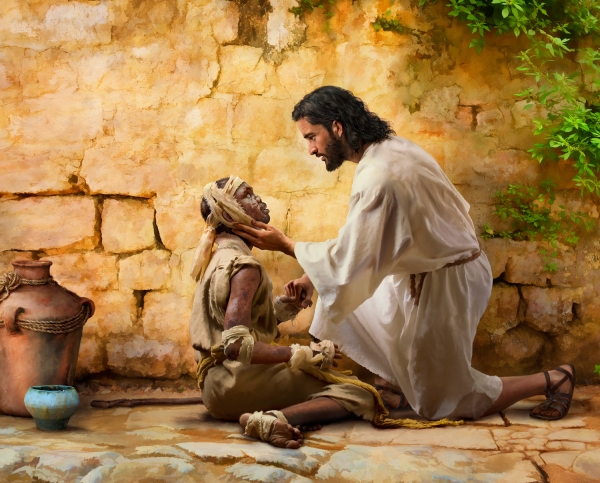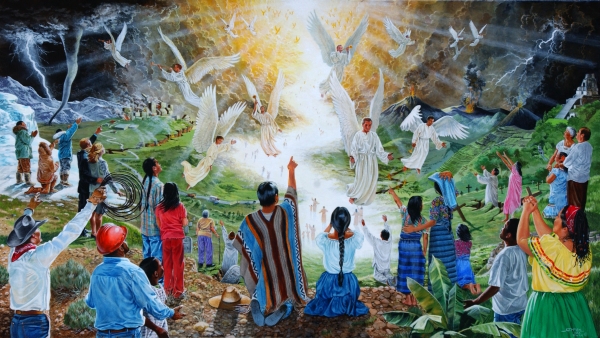
Mark Finley, DD
The Tyranny of the Urgent
It has been over twenty five years, but the scene is indelibly impressed upon my mind. My Russian hosts invited me to the Moscow circus. I am not a circus-goer, but the Russian circus is world famous for its acrobatic performers, and so I agreed. The audience was awed with the high flying acrobatic team. They wildly applauded the spectacular feats of these gymnasts.
I was more interested in something else – the plate spinner. The plate spinner took some kind of fine china, spun it as fast as he could, and placed it upon a slender spinning pole. Then he began another pole spinning and placed plates on that pole, then another and another . . . . Unless he kept the plates spinning, the whole thing would crash and plates would shatter. Imagine this man, running breathlessly from pole to pole to keep them spinning. As I remember, the plate spinner had about five poles going at once.
 Have you ever felt like a plate spinner? You find yourself running from one thing to the next, overwhelmed with the tyranny of the urgent. You just have too much to do, and when you flop in bed at night, you’re tossing and turning as you fret about all that’s still undone.
Have you ever felt like a plate spinner? You find yourself running from one thing to the next, overwhelmed with the tyranny of the urgent. You just have too much to do, and when you flop in bed at night, you’re tossing and turning as you fret about all that’s still undone.
In light of the tyranny of the urgent, I’d like to think about the life of One who could easily have been overwhelmed with the tasks before Him, and yet exuded peace wherever He went. There was a calmness, an unrushed presence, and a focused purpose about Christ.
One of the most amazing, yet startling, statements in Scripture is found in John 17:4. Jesus has come to the end of His life and, reflecting over His short thirty-three and a half years, and His even shorter three and a half year ministry, Jesus made this remarkable statement:
“I have glorified you on earth. I have finished the work which you have given me to do.” – John 17:4
What did Jesus mean by these words? After all, there were still hungry people to feed. There were still sick people to heal. There were still demon-possessed people to deliver. There were still sinners to forgive. There were still broken people to be made whole. There were still dead people to raise. There were still lost people to save.
Notice what our text does not say. It does not say that Jesus “finished everything that He wanted to do.” I am confident that the Savior desired to heal many more people. I am confident that there was more, much more, He would have liked to do for people in need. He left many useful tasks undone. He left many urgent requests unmet. Instead, the text says: “I have glorified you on earth. I have finished the work which you have given me to do.”
Jesus was focused on God’s mission. There was still more work that needed to be accomplished – still more needs that had to be met. But Jesus did not live by others expectations. He was in tune with the Father’s will.
To glorify God is to fulfill the task you were born for and to complete the work He has given you to do.
First Principle: Seek the Father’s Will
This leads me to the first of three eternal principles on how to live a life of peace amid the tyranny of the urgent.
1. Seek the Father’s will in every decision we make.
“…Lo, I come (in the volume of the book it is written of me,) to do thy will, O God.” – Hebrews 10:7
“…O My Father, if it is possible, let this cup pass from Me; nevertheless, not as I will, but as you will.” – Matthew 26:39
Jesus was totally committed to doing the Father’s will. The overriding principle that governed Jesus’ life was, in every instance, to discover the Father’s will and, by His grace and through His power, to do it.
Wouldn’t it be tragic to accomplish a great deal but miss the purpose that you were born for? Wouldn’t it be tragic to accomplish all the goals that you have set for your life but fail to accomplish the goals that God has set for your life? Wouldn’t it be tragic to come to the end of your life and say, “I have accomplished my dreams but failed to accomplish God’s dream.”
The question is not: ‘What are my plans for my life?’ but rather, ‘What are God’s plans for my life?’ There is a very thought provoking statement regarding Jesus’ priorities in Desire of Ages.
“But the Son of God was surrendered to the Father’s will, and dependent upon His power. So utterly was Christ emptied of self that He made no plans for Himself. He accepted God’s plans for Him, and day by day the Father unfolded His plans. So should we depend upon God, that our lives may be the simple outworking of His will.
– Desire of Ages, p. 208
Does this mean that we should make no plans at all, but just kind of let things come and go in some random, chaotic way?
Not at all. That would be irresponsible. The statement does not say that Jesus made no plans. It does say that He made no plans for Himself. Jesus’ life was dedicated to one thing – doing the Father’s will. His one goal was to glorify the Father.
Are you willing to seek God’s will in each situation by seeking to glorify Him in each decision of life?
The fundamental question of life is: What is God’s will for my life?
What is God’s will for my practice? What is God’s will regarding my relationship with my staff and patients? What is God’s will with how I use my time and money? What is God’s will as I relate to my spouse and children? What is God’s will in my entertainment practices? What is God’s will in my personal health habits, such as diet and exercise? The essence of life is to seek God’s will, to discover God’s will, and to do God’s will.
There is one other aspect of this principle of discovering God’s will. If you seek God’s will in every situation, you actually have more time, not less, because a lot of frivolous stuff will be shed. You will focus on the most important. Doing God’s will, and bringing Him glory, will be the supreme desire of your life. It is written of His end-time people that they “fear God and give glory to Him.”(Revelation 14:6) This principle weeds out a thousand trivial things and makes possible this amazing truth: “If every moment were valued and rightly employed, we should have time for everything that we need to do for ourselves or for the world. In the expenditure of money, in the use of time, strength, opportunities, let every Christian look to God for guidance. ‘If any of you lack wisdom, let him ask of God, that giveth to all men liberally, and upbraideth not; and it shall be given him.’”
– Ministry of Healing, p. 208
Notice, the statement does not say, “Everything that we want to do.” It says, “Everything that we need to do.”
There may be many things we want to do, but they are not the most important. They may be urgent, but they are not eternally significant.
Jesus did not finish all the work that could have been done in Judea and Samaria. He did not accomplish all that He would have liked. But He did finish the work that God gave Him to do. The only alternative to frustration when you are overloaded with work is to seek what is God’s will in a given situation. Because, if you are overloaded, it may be that you have taken on assignments that God himself has never given you.
The first eternal principle also focuses on a prayer. It is a dangerous prayer. It is an honest evaluation of my life and getting on my knees and saying, ‘God what is your will for my practice? Lord, what is your will for my medical ministry? Lord what is your will for my life?’
Here is the problem that solves all problems – a surrender of the will. Once the will is surrendered to Christ, you don’t have to battle anymore on things that you don’t want to do because you already surrendered all that to Christ.
Are you willing to ask one of life’s most dangerous yet most satisfying questions, ‘Lord, what is your will for my life and in this situation?’
 Second Principle: Distinguish Between the Urgent and the Eternally Significant
Second Principle: Distinguish Between the Urgent and the Eternally Significant
The story of Lazarus’ resurrection reveals Christ’s ability to discern between the urgent and the eternally significant. In John 11:6, we read: “So when He [Jesus] heard that he [Lazarus] was sick, He stayed two more days in the place where He was.”
Jesus has the ability to heal His friend, Lazarus. He has received the message that Lazarus is deathly sick, but Jesus does not move. He waits two days and during this two day delay, Lazarus dies. Martha is so distressed that, in verse 21, she sorrowfully states, “If you had been here my brother would not have died.” Why would Jesus neglect something so urgent as healing a man whose life was quickly ebbing away? Why would Jesus delay when medical attention was so urgent?
The resurrection of Lazarus is a powerful example, showing that Jesus understood the difference between the urgent and the eternally significant. It was urgent to heal a sick man, but the most important thing was to raise Him from the dead.
It was urgent to cure sickness, but more important to reveal the loving character and resurrection power of God by calling him forth from the grave to new life.
The healing of Lazarus would have been a good thing. Raising him from the dead was a great thing. Healing Lazarus would have impressed people, raising him from the dead demonstrated the power of God even more dramatically.
Jesus had a divine sense of timing; He knew the difference between the urgent and the eternally significant.
“It is the very essence of all right faith to do the right thing at the right time. God is the great Master Worker, and by His providence He prepares the way for His work to be accomplished. He provides opportunities, opens up lines of influence and channels of working. If His people are watching the indications of His providence, and stand ready to co-operate with Him, they will see a great work accomplished. Their efforts, rightly directed, will produce a hundredfold greater results than can be accomplished with the same means and facilities in another channel where God is not so manifestly working.”
– Testimonies for the Church, vol. 6, p. 24
 A number of years ago an African friend told me this remarkable story. His grandfather lived in a rural village. Poverty was rampant and the villagers were extremely hungry. Getting food immediately was urgent. Grandfather had an old rifle but only one bullet. He decided one evening at the setting of the sun to go hunting. As he quietly crawled up a hill he noticed a herd of gazelle on the hillside. As he took aim at one large buck, he noticed a deadly snake, a black mamba between him and the buck. What should he do? Shoot the snake or the buck? He decided to back up, crawl around to the other side of the hill and shoot the buck. It was urgent. His family needed something to eat.
A number of years ago an African friend told me this remarkable story. His grandfather lived in a rural village. Poverty was rampant and the villagers were extremely hungry. Getting food immediately was urgent. Grandfather had an old rifle but only one bullet. He decided one evening at the setting of the sun to go hunting. As he quietly crawled up a hill he noticed a herd of gazelle on the hillside. As he took aim at one large buck, he noticed a deadly snake, a black mamba between him and the buck. What should he do? Shoot the snake or the buck? He decided to back up, crawl around to the other side of the hill and shoot the buck. It was urgent. His family needed something to eat.
As he approached the opposite side of the hill with a sense of satisfaction, he slowly took aim at the large gazelle grazing on the hillside. Suddenly he felt a sharp pain in the back of his leg. The black mamba had followed him and attacked from behind. He lay writhing in pain. The villagers came to find him; he had only a few hours to live. Typically humans die from a black Mamba bite (or series of bites) in 20 minutes – 3 hours. His dying words, “If there’s only one bullet in the gun…shoot the black mamba!” You see, he had to make a choice. Do I feed the family, or do I save my life? His priorities were mixed up.
There is a difference between the urgent and the important. It may have been urgent to eat, but it was vitally more important for him to save his life.
Maybe there’s no black mamba chasing you, but sometimes it is possible to make a decision that puts deadly poison in our being because we mistake our priorities. Entertainment becomes more important than devotions. That’s the “Black Mamba Syndrome.” Work becomes more important than church. If I work incessantly and am too tired to go to church on Sabbath morning – that’s the “Black Mamba Syndrome”.
Jesus was able to distinguish between the two. Are you willing to ask Jesus to help you every day to distinguish between the things that are urgent and the things that are eternally significant? There are many things that you might like to do, many things which are urgent, but only some things which are the most important.
Here’s the prayer we pray on that second principle. “Jesus lead me today to distinguish between the urgent things and the eternally significant things.”
Third Principle: To Know God and to Make Him Known
Mark 1 is one of the clearest chapters in the Bible on Christ’s life purpose. If you read through the chapter, you can see that, even in the busyness of His life, Jesus had time for Sabbath worship. He also did healing in the context of worship. At fellowship dinner in Simon Peter and Andrew’s
house, He ministered to Simon’s mother-in-law, who was sick. Then, later, we see in verse 32 that crowds came after Sabbath to be healed and ministered to. Jesus had a respect for the Sabbath and was spiritually refreshed as He worshipped and fellowshipped with His disciples.
The entire city comes to the door. Jesus works miracle after miracle but early in the morning He rises a great while before daybreak to pray. It is a solitary place, and He is alone communing with the Father.
Personal communion, Sabbath worship, daily devotions—all these take time. The urgent was calling Christ, but the eternally significant was His priority. Are you willing to spend time in the presence of God, even when the clamoring voices of the urgent are calling out all around you?
The disciples search for Jesus and explained that everyone was looking for Him. There were sick people to be healed, demons to be cast out and the hungry to be fed. I can almost hear Simon Peter saying, ‘It’s urgent. Let’s go. Everyone is looking for you.’ Jesus startles Peter and startles us as we read His response. “Let us go into the next towns, that I may preach there also, for this purpose I have come forth.” – Mark 1:38
Healing the sick was urgent, but there was something more important. Christ came into the world to share the gospel – the good news of His grace and eternal power. Treating diseased bodies was part of the healing ministry of Christ, but ministering to diseased souls was His ultimate purpose. Curing illness mattered to Christ but communicating God’s plan of salvation was even more significant. Revealing the Father’s character of loving compassion and care through the healing of the sick was crucial in answering Satan’s charges in the great controversy but revealing heaven’s power to save was even more important. That is why God’s messenger to the Remnant states, “Every physician should be a devoted, intelligent gospel medical missionary, familiar with Heaven’s remedy for the sin-sick soul as well as with the science of healing bodily disease.” -Medical Ministry p. 31.
 Conclusion
Conclusion
We have each been uniquely called and our ultimate purpose in life is to know Christ and make Him known.
May each of us commit, in the depths of our soul, to allow Jesus to help us distinguish between the things that are urgent and those that are eternally significant. May our ultimate purpose in life be to truly know God, glorify Him, and make Him known.
Yes, at times you might feel like the plate spinner in the Russian circus whom I saw. But if you seek to follow these three principles, your life will be transformed.
First, are you willing to surrender your time, your finances, your practice, and your life to God? Are you willing to be ‘sold-out’ for Christ? To seek God’s will in every significant decision you make? Are you willing to understand His purpose for your life more deeply?
Second, are you willing to ask God to help you distinguish between the temporal and the eternal? Between the good things and the great things? Between that which is important and that which is eternally significant? Are you willing to pause, stop running, evaluate and place your priorities on the things that count for eternity?
Third, are you willing to commit to spending time with God every day?
In order to give we must receive. If we are going to share Christ’s love with others, that love must fill our hearts. Christ’s strength and power must so fill us that it changes our lives.
Are you willing to say with me, ‘Lord I commit myself to the renewal of Sabbath and communion with you. Help me to never forget the ultimate purpose of life. Help me to never forget the reason you have called me to be a medical missionary. Help me to be an ambassador of your love, a minister of your grace, an evangelist for your Kingdom. Help me to know that together our calling is to prepare a people for the coming of Jesus.’
<< | Table of Contents | >>
